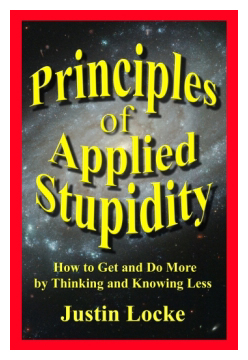Years ago I was doing a presentation on “Real Men Don’t Rehearse,” my Pops memoir, and someone asked me how I managed to play in the Boston Pops when I was only 20 years old. I said, “Because I was too dumb to know it was impossible.”
There was a bit of truth in that flippant remark. If I had known how hard it was going to be, I doubt I ever would have even attempted it.
I didn’t know anything about writing plays or books either, but when I self-published my first book, a month later I found myself being interviewed on CBS radio, an opportunity even bestselling authors seldom get.
Lacking any logical explanation for these extraordinary events at the time, I truly believed that I had a “guardian angel.” After all, these successes by a rather ignorant farm boy from Ohio defied all conventional wisdom. So “Principles of Applied Stupidity” started out as pure fun, to be the basis for a comedic corporate presentation on rising to the top a la “The Dilbert Principle” (i.e., “The stupidest people in a company are promoted to management because that is where they can do the least amount of damage”).
But once I got into writing the book, my thoughts started to coalesce. I started to see science in this apparent nonsense of sheer luck. I came to see that throughout my formative years, I had spent much of my time sitting in classrooms; and in these government-run scholarly institutions, for all the ostensible good intentions, there was a clear and uniform idea taught every day about what was right and wrong, and what was smart and stupid. And oddly enough, when I did things that these people said were “stupid,” I got much better results.
I gradually came to see that in those environments that the law requires us to attend, “smart” was what people in authority wanted, and “dumb” was what they didn’t. And any deviation from their version of reality was not logically debated, it was suppressed with shame and ridicule.
There is much to be said for education, but what is “smart,” i.e, what is pleasing to an overworked underpaid government employee teaching in a public school classroom, isn’t necessarily what will take you to the top of your field. Every day I encounter people who fervently believe in these systems, and they are shocked when I point out that the top leaders of American finance and technology are 75% college dropouts.
The shame and fear that is part and parcel of the standard classroom experience gets in the way of your innate ability to do trial-and-error problem solving. There is a great learned fear of “looking stupid” that gets in the way of personal development, effective leadership, and creativity. To me, this is downright un-American.
I felt the best way to deal with this backlog of collective fear and shame was to continue with the humorous approach, of making the book sound like a late-night infomercial for a miracle product for slimming thighs or growing hair. The humor is key because it is the best way to deal with the buried fear and shame that the book is designed to address and overcome.
The whole concept of judging your “intelligence” by one standard, and one-way broadcast learning in general, is quickly becoming obsolete. Anything that makes you similar to other people makes you more of a commodity, and therefore lowers your value. Anything that makes you unique raises it. In school we are taught to fear being different. I say, learn to embrace your inner idiot.
© Justin Locke

